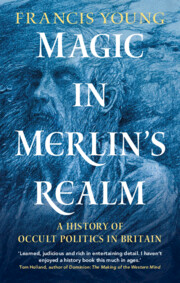Book contents
- Magic in Merlin’s Realm
- Reviews
- Frontispiece
- Magic in Merlin’s Realm
- Copyright page
- Dedication
- Contents
- Plates
- Preface
- Introduction
- 1 ‘Britain Indulges in Magic’
- 2 The Secrets of the King
- 3 Arthurian Dynasty
- 4 House of the Unicorn
- 5 Politics and the Decline of Magic, 1649–1714
- 6 Emanations of Albion
- Conclusion
- Bibliography
- Index
- Plate Section (PDF Only)
4 - House of the Unicorn
Stuart Monarchy and the Contest for Occult Authority
Published online by Cambridge University Press: 07 February 2022
- Magic in Merlin’s Realm
- Reviews
- Frontispiece
- Magic in Merlin’s Realm
- Copyright page
- Dedication
- Contents
- Plates
- Preface
- Introduction
- 1 ‘Britain Indulges in Magic’
- 2 The Secrets of the King
- 3 Arthurian Dynasty
- 4 House of the Unicorn
- 5 Politics and the Decline of Magic, 1649–1714
- 6 Emanations of Albion
- Conclusion
- Bibliography
- Index
- Plate Section (PDF Only)
Summary
The Stewarts ruled Scotland from 1371 and England from 1603 and experienced magical threats to their rule from the fifteenth century onwards. King James VI and I’s historical reputation as a demonologist obsessed with witchcraft conceals what was a subtle approach to magic and witchcraft, to which James responded with an equal mixture of fascination and scepticism. Attacked by witches in his homeland, James’s accession to the English crown in 1603 saw James became conspicuously more circumspect in his dealings with supernatural claims south of the border. Whatever his personal views, magical scandals at James’s court and at the court of his successor Charles I inflicted immense reputational damage on the Stuart monarchy between 1613 and 1628. Beginning with the Overbury Plot, these scandals culminated in the accusations levelled against the duke of Buckingham and his ‘wizard’, John Lambe and ultimately undermined the credibility of the monarchy as a guardian of godliness in the nation. The outbreak of Civil War in England in 1642 unleashed pent-up anxieties about the political use of magic in the form of lurid allegations from both sides that their enemies were making use of sorcery and witchcraft to influence the outcome of the conflict.
Information
- Type
- Chapter
- Information
- Magic in Merlin's RealmA History of Occult Politics in Britain, pp. 190 - 233Publisher: Cambridge University PressPrint publication year: 2022
